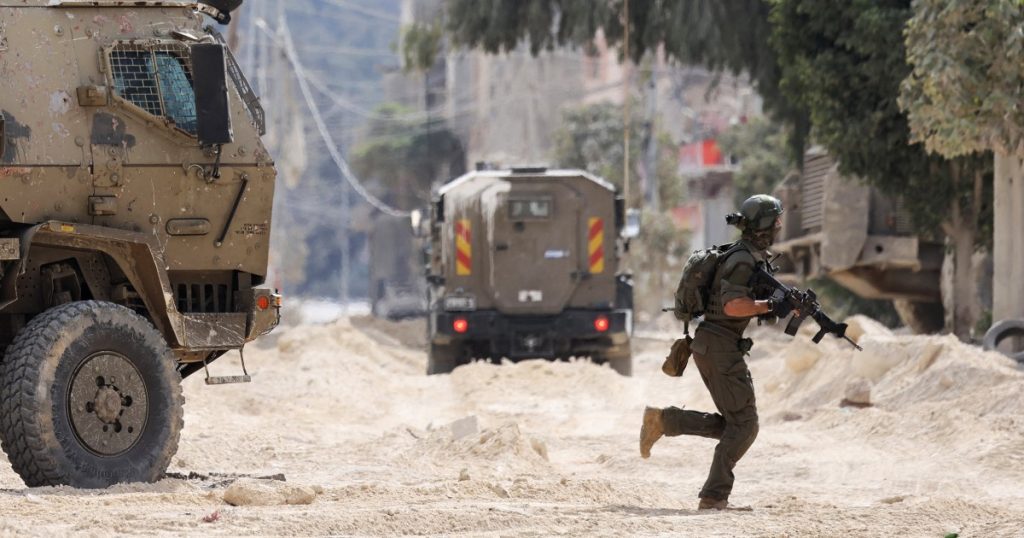Israeli forces conducted an aerial counterterrorism operation in Al-Faraa refugee camp in the West Bank, resulting in the death of four armed militants. The Palestinian health ministry reported at least nine people killed overnight, with Israeli forces surrounding the area and blocking access to hospitals. The Nour Shams camp in Tulkarem was warned by the Palestinian Authority of possible raids, though evacuations were not mandatory. The Israeli Foreign Minister linked the raids to the ongoing war in Gaza, calling it a “full-fledged war” that Israel must win. He accused Iran of funding and arming terrorist infrastructures in the region, creating tensions and violence.
Israeli authorities believe that Iranian-backed terrorist groups are establishing a eastern front against Israel in the West Bank, similar to Gaza and Lebanon, leading to intensified operations in Jenin and Tulkarem. Foreign Minister Katz emphasized the need for Israel to address this threat with the same intensity as they have in Gaza, including considering the temporary evacuation of Palestinian residents. The Israeli Defense Forces were described as operating with intensity to eliminate Islamic-Iranian terrorist infrastructures in the region, with Israel frequently accusing Iran of supporting militant groups and fostering violence in the area. The recent raids in the West Bank occur against a backdrop of heightened tensions in the region, particularly due to Israel’s operations in Gaza and the recent assassination of Hamas leader Ismail Haniyeh.
Tensions in the region escalated further as hostilities erupted at Israel’s northern border with Lebanon, where Israeli forces and Iran-backed militant group Hezbollah engaged in fire exchanges following the assassination of commander Fuad Shukr. Iran has vowed retaliation against Israel for the assassination of Haniyeh, sparking fears of further violence and conflict in the region. The ongoing offensive in Gaza by Israel has also contributed to the volatile situation, with concerns over the potential for broader conflict involving multiple actors. The situation remains fluid and complex, with the involvement of various regional powers and militant groups adding layers of complexity to the already unstable situation.
The Israeli government’s response to the perceived threat from Iranian-backed terrorist groups in the West Bank reflects a broader strategy of countering perceived threats from Iran in the region. By linking the raids in the West Bank to the ongoing conflict in Gaza and tensions with Iran, Israel is framing its actions as part of a larger effort to combat terrorism and ensure its security. The Israeli Foreign Minister’s statements underscore the seriousness of the situation and the perceived need for decisive action to address the threats posed by Iran and its proxies in the region. The intensification of operations in the West Bank indicates a willingness on Israel’s part to take preemptive measures to prevent potential attacks by terrorist groups.
The impact of the raids and Israeli military operations in the West Bank on civilian populations remains a cause for concern, with reports of casualties and blockades preventing access to medical care. The warnings issued to Palestinian authorities ahead of the raids suggest a level of coordination between the parties, though the lack of mandatory evacuations raises questions about the protection of civilians in conflict zones. The involvement of multiple actors, including Iranian-backed groups and militant organizations, adds further complexity to the situation and raises fears of spiraling violence and conflict. The need for diplomatic efforts to de-escalate tensions and prevent further violence is becoming increasingly urgent as the situation continues to evolve.
In conclusion, the recent raids in the West Bank and the broader context of escalating tensions in the region highlight the complexities and challenges facing efforts to promote peace and stability. The involvement of multiple actors, including state and non-state actors, in the conflict underscores the interconnected nature of the various conflicts in the region and the need for coordinated responses to address the root causes of violence. The role of Iran in supporting militant groups and fostering instability poses a significant challenge to regional security and peace efforts, necessitating a comprehensive and coordinated approach to address the underlying issues driving conflict. As the situation continues to evolve, the need for dialogue, diplomacy, and international cooperation becomes increasingly vital in order to prevent further escalation and promote lasting peace in the region.


